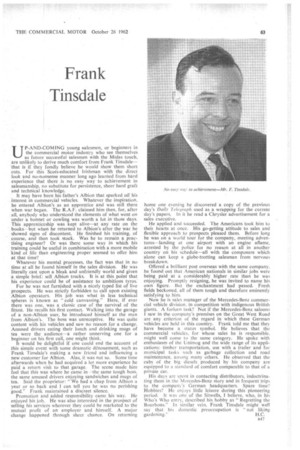Frank Tinsdale
Page 65

If you've noticed an error in this article please click here to report it so we can fix it.
UP-AND-COMING young •salesmen, or beginners in the commercial motor industry who see themselves as future successful salesmen with the Midas touch, are unlikely to derive much comfort from Frank Tinsdale.that is if, they fondly believe he would show them short cuts. For this Scots-educated Irishman with the direct Look and no-nonsense manner long ago learned from hard experience that there is no easy way to achievement in salesmanship, no substitute for persistence, sheer hard graft and technical knowledge.
It may have been his father's Albion that sparked off his interest in commercial vehicles. Whatever the inspiration, he entered Albion's as an apprentice and was still there when war began. The R.A.F. claimed him then, for, after • all, anybody who understood the elements of what went on under a bonnet or cowling was worth a lot in those days. This apprenticeship was kept alive—at any rate on the
• books--but when he returned to Albion's after the war he showed signs of discontent. He finished his training, of course, and then took stock. Was he to remain a practising engineer? Or was there some way in which his training could be useful in combination with a more mobile kind ot life than engineering proper seemed to offer him at that time?
Whatever his mental processes, the fact was that in no time at all he found himself in the sales division. He was literally cast upon a bleak and unfriendly world and given a simple brief: sell Albion trucks. It is at this point that his experience could be of assistance to ambitious tyros.'
For he was not furnished with a nicely typed list of live prospects. He was strictly forbidden to call upon existing Albion operators. His job was what in less technical spheres is known as "cold canvassing." Here, if ever there was one, was a classic case of the survival of the fittest. He recalls his first contact. Walking into the garage of a non-Albion user, he introduced himself as the man from Albion's. The boss was unreceptive. He was quite content with his vehicles and saw no reason for a change. Amused drivers eating their lunch and drinking mugs of tea were the audience—a rather unnerving one for a beginner on his first call, one might think.
It would be delightful if one could end the account of this simple event with some dramatic de'nouement, such as Frank Tinsdale's making a new friend and influencing a new customer for Albion. Alas, it was not so. Some time afterwards when he had acquired a lot more experience he paid a return visit to that garage. The scene made him feel that this was where he came in -the same tough boss, the same amused drivers enjoying sandwiches and mugs of tea. Said the proprietor: We had a chap from Albion a year or so back and I can tell you he was no perishing good." Frank maintained a discreet silence. Promotion and added responsibility came his way. He enjoyed his job. He was also interested in the prospect of selling his services wherever they could be marketed to the mutual profit of an employer and himself. A major change happened through sheer chance. On returning
home one evening he discovered a copy of the previous day's Daily 'Telegraph used as a wrapping for the current day's papers. In it he read a Chrysler advertisement for a sales executive.
He applied and succeeded. The Americans took him to their hearts at once. His go-getting attitude to sales and flexible approach to prospects pleased them. Before tong he was on a world tour for the company, meeting adventures—landing at one airport with an engine aflame, arrested by the police for no reason at all in another country on his schedule—all with the composure which alone can keep a globe-trotting salesman from nervous breakdown.
Offered a brilliant post overseas with the same company, he found out that American nationals in similar jobs were being paid at a considerably higher rate than he was enjoying. Promptly resigning, he was invited to name his own figure. But the enchantment had passed. Fresh fields beckoned, all of them tough and therefore eminently satisfying to him.
Now he is sales manager of the Mercedes-Benz commercial vehicle division, in competition with indigenous British giants. A forlorn task? Not if the Mercedes-Benz saloons I saw in the company's premises on the Great West Road are any criterion of the regard in which these German vehicles are held in this country. Frank told me that they have become a status symbol. He believes that the commercial vehicles, for whose sales he is responsible, might well come to the same category. He spoke with enthusiasm of the Unimog and the wide range of its applications: timber transportation, use with a trailer and for municipal tasks such as garbage collection and road maintenance, among many others. He observed that the cabs of the big diesels produced by his company are equipped to a standard of comfort comparable to that of a private car.
His days are spent in contacting distributors, indoctrinating them in the Mercedes-Benz story and in frequent trips to the COMpaIWS German headquarters. Spare time? Hobbies? He enjoys little leisure during this pioneering period. It was one of the Sitwells, I believe, who, in his Who's Who entry, described his hobby as "Regretting the Bourbons." In similar vein, Frank Tinsdale might well say that his domestic preoccupation is " not liking
gardening.' H.C.




































































































